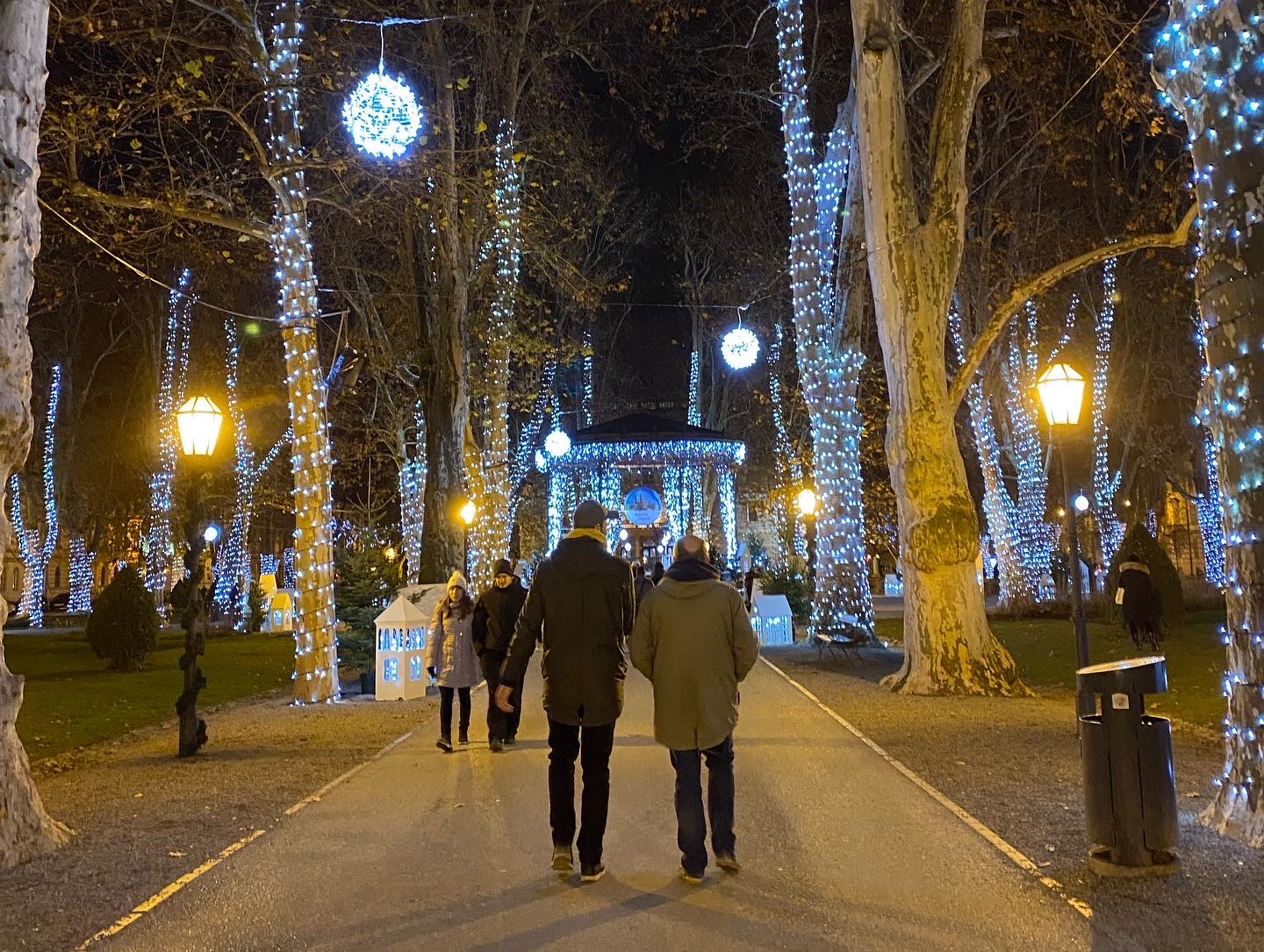Ten Water Management Investment Projects Signed
ZAGREB, 16 Dec 2021 - Ten contracts worth HRK 116.4 million were signed on Thursday to finance water management projects as part of the 2021-26 National Recovery and Resilience Plan.
The contracts were signed at the Hrvatske Vode water management company by Economy Minister Tomislav Ćorić and Hrvatske Vode general manager Zoran Đuroković.
They said these ten contracts were the first step in utilizing National Recovery and Resilience Plan funds.
The contracts concern the allocation of grants from the EU Recovery and Resilience Facility to finance investment in public water supply and drainage projects. A total of 70 projects were submitted and the maximum amount available for allocation is HRK 800 million.
Contracts were also signed on the national component of co-financing the projects.
One of the signatories is the Pula city waterworks. Their project is the most valuable at HRK 44.5 million, with the grant amounting to HRK 28.5 million. The company's director, Dean Starčić, said the money would be used to reconstruct and construct pipelines.
(€1 = HRK 7.5)
For more, check out our dedicated politics section.
Končar Group's Sales Revenues to Hit All Time High of €470m in 2021
ZAGREB, 16 Dec (Hina) - The Končar Group, specializing in the production of electrical equipment and installations, is set to reach a record high revenue from sales in 2021, of HRK 3.5 billion (€466 million), and it plans to raise those revenues to HRK 3.78 billion (€504m) in 2022, according to the group's business plan.
"KONČAR Group is expected to end the business year 2021 with the historically highest revenue from sales in the amount exceeding HRK 3.5 billion. In 2022, the revenue from sale of products and services is expected to be HRK 3.78 billion. A further 5.4 percent growth in export revenue is projected, with export accounting for 60 percent of the planned revenue from sales," reads a press release issued by this leading Croatian electrical company on the Zagreb Stock Exchange (ZSE) on Thursday.
In accordance with the adopted Integrated Strategy of KONČAR Group, investments planned for 2022 amount to HRK 209 million, reads the press release.
The planned CAPEX (Capital expenditures) "pertains primarily to investments in plant and equipment, increased production capacities in several KONČAR Group companies, continued digitalization, and further development of environmentally friendly products. The majority of the planned investments will be financed using the Group’s own resources."
(€1 = HRK 7.5)
For more, make sure to check out our dedicated business section.
Reflections on the First TCN Split Winter Tourism Roundtable
December 16, 2021 - The first TCN Split Winter Tourism Roundtable took place on Monday at CHOPS Grill in Split. Some reflections...
As I looked above the excellent steak that was served for lunch after the TCN Split Winter Tourism Roundtable, I smiled (see photo above). For opposite me, at the other side of our rectangular roundtable, were perhaps the four public officials who could have the most influence in helping the initiative to extend the Split tourist season to succeed.
And I had history with all four.
Central Dalmatia Tourist Board Director Josko Stella actually gave me my first job in 12 years back in 2013 (after more than a decade of being self-employed) when he invited me to become the official Central Dalmatian Tourist Board blogger, a position I held for 7 happy years. It is something I will always remember with gratitude.
Next to him, Mayor of Split Ivica Puljak, who I first met with his wife, MP Marijana Puljak, over a coffee in Jelsa in 2018, as they wanted to show support for me after the Mayor of Jelsa announced he was suing me (he never did). And it was Marijana who stood up in Parliament last year to raise my case of the SLAPP lawsuit by the Croatian National Tourist Board last year.
Next to him, State Secretary of the Ministry of Tourism and Sports, Tonci Glavina, a man with Klis running through his veins, whose lovely wife Tracey was the first-ever writer for TCN back in 2015.
And next to Tonci, Split Tourist Board Director Alijana Vuksic, who has been supporting firstly Total Split, and then TCN, since 2014.
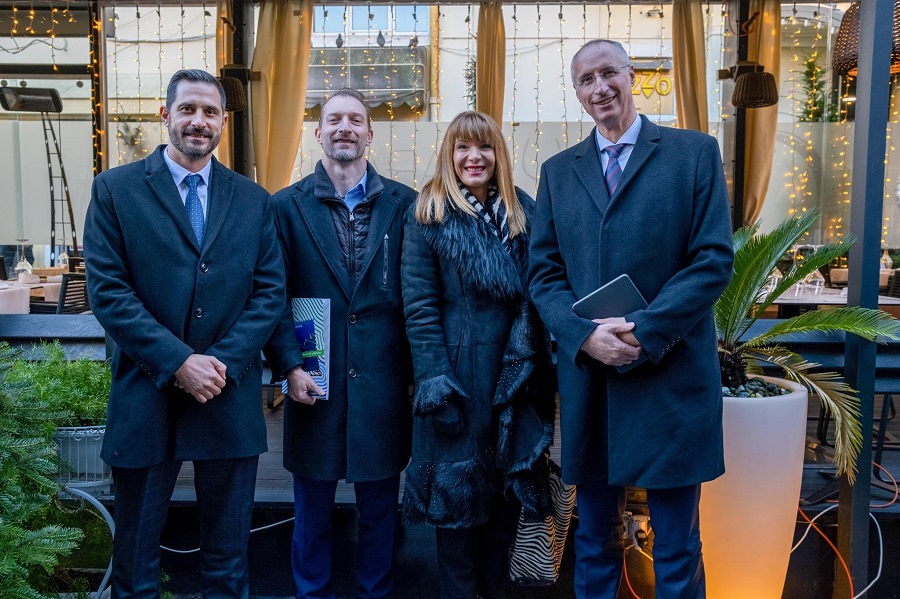
(Four key figures from the public sector - Tonci Glavina, Josko Stella, Alijana Vuksic, and Ivica Puljak)
To their left and to their right, additional figures from the public sector in the form of the Croatian Chamber of Commerce, county representative, and the Deputy Director of Split Airport, as well as some of the most important names from the private sector - GMs from 5-star hotels, tourism consultants, and representatives from the MICE, hotels, hostels and restaurant sectors.
They all came. Everyone who was invited.
And they all - without exception - left their egos and agendas at home, came to listen, then to speak, and then to engage. I won't pretend that it was straightforward to get everyone to the table, because it wasn't, but it will be a lot easier next time, because everyone left pleasantly surprised at how constructive the session was. And I think everyone left with a feeling that here was a very real chance of developing something concrete, meaningful and lasting.
While I am by no means a tourism expert, one man who is is Zoran Pejovic of Paradox Hospitality, whose contributions were poignant (and we are all very excited to learn more about the 200 million euro investment he is bringing to the Central Dalmatia region). This is what he posted on LinkedIn after our meeting:
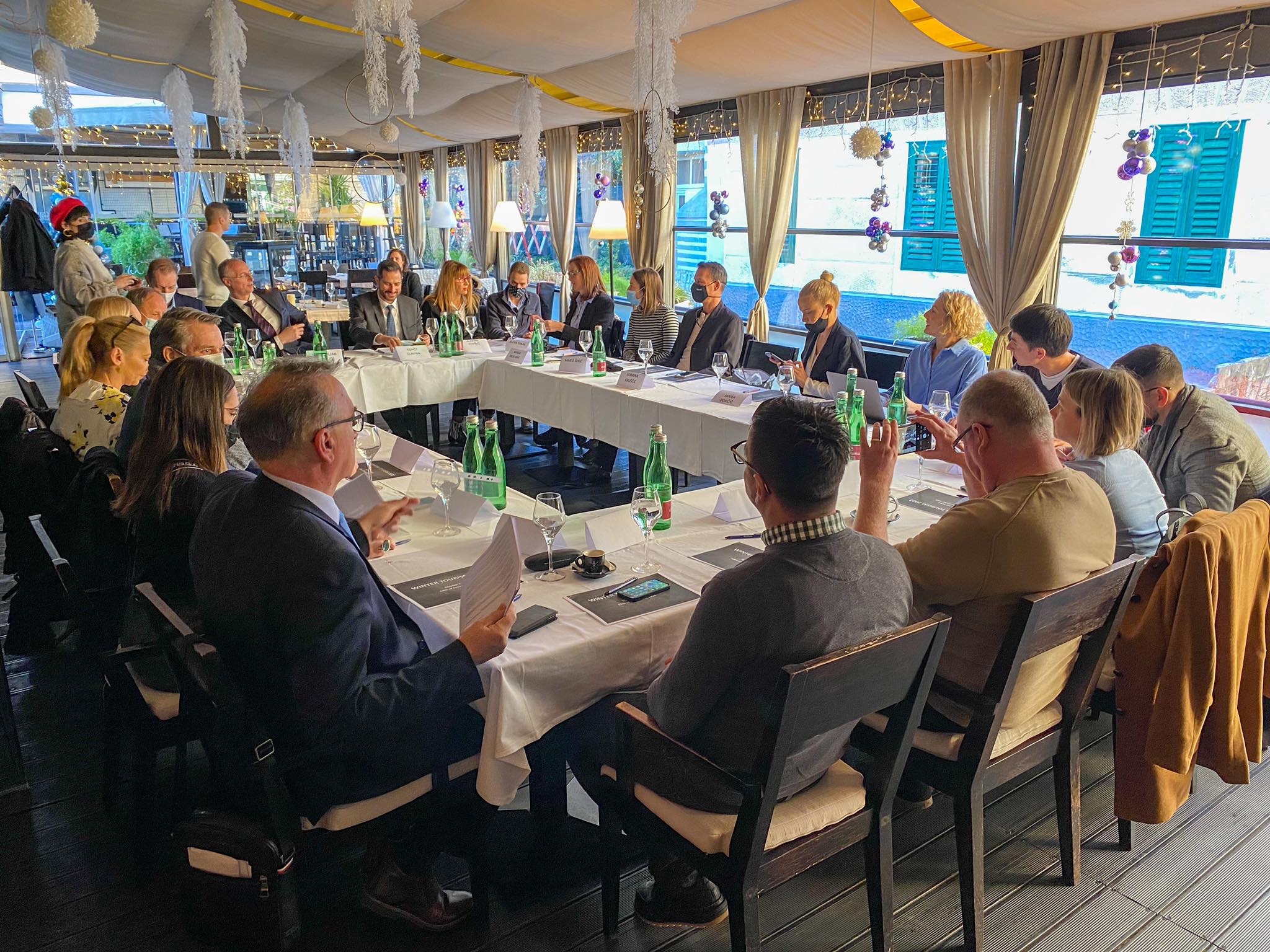
Yesterday morning I had looked at my super packed schedule for the day and for a brief moment contemplated calling Paul Bradbury to inform him that I can't make it to his "round table" discussion on the topic of Split tourism and its shoulder and off-season activities, promotions and most importantly connectivity. That would have been a mistake.
No, we didn't solve all of Split and Dalmatia's low-season tourism challenges. However, we had a very substantiated and civilized discussion with some of the stakeholders exchanging contacts for the first time and most of the participants exchanging thoughts and ideas in this format for the very first time. We had Mayor of Split, Ivica Puljak at the head of the table, together with the State Secretary in the Ministry of Tourism, Tonči Glavina. We had representatives of Split hotels, hostels, restaurants associations, DMCs as well as heads of Split Airport, Tourism Boards and Chamber of Commerce. And I was there, and I am happy to have been there.
Perhaps I had such low expectations of this round table that it was not difficult to exceed it, but this was so well organized by Paul Bradbury and Daniela Rogulj, so well moderated by Michael Freer, so well hosted by Jasmina Garbin that I have left feeling that there is yet hope for us in creating a better and more thought-through tourism in Dalmatia.
Now, a couple of comments from my side. I believe that the job of building better and more diversified tourism products and promotion of the destination rests on the shoulders of the private sector, not the public officials and the governments. That said, we need public offices to provide better infrastructure where possible and to reduce the tax burdens when possible, in order to make us more competitive with our Mediterranean competitors. Also, we all need to understand that we will not be having a lack of travellers moving forward, but the lack of workers and if this is not addressed structurally we will have nothing to discuss in the future. We need tips for the service personnel to be non-taxed until certain limits, capping it at around 700 euros a month. We finally need to start developing proper hospitality managers, from Hotel General Managers and Sales and Marketing Directors to operations executives and to make this industry desirable once again. And lastly for this post, lastly only because of LinkedIn post character limit :), we need to make a strong push for excellence and within that make no concessions on the road to more responsible hospitality and tourism.
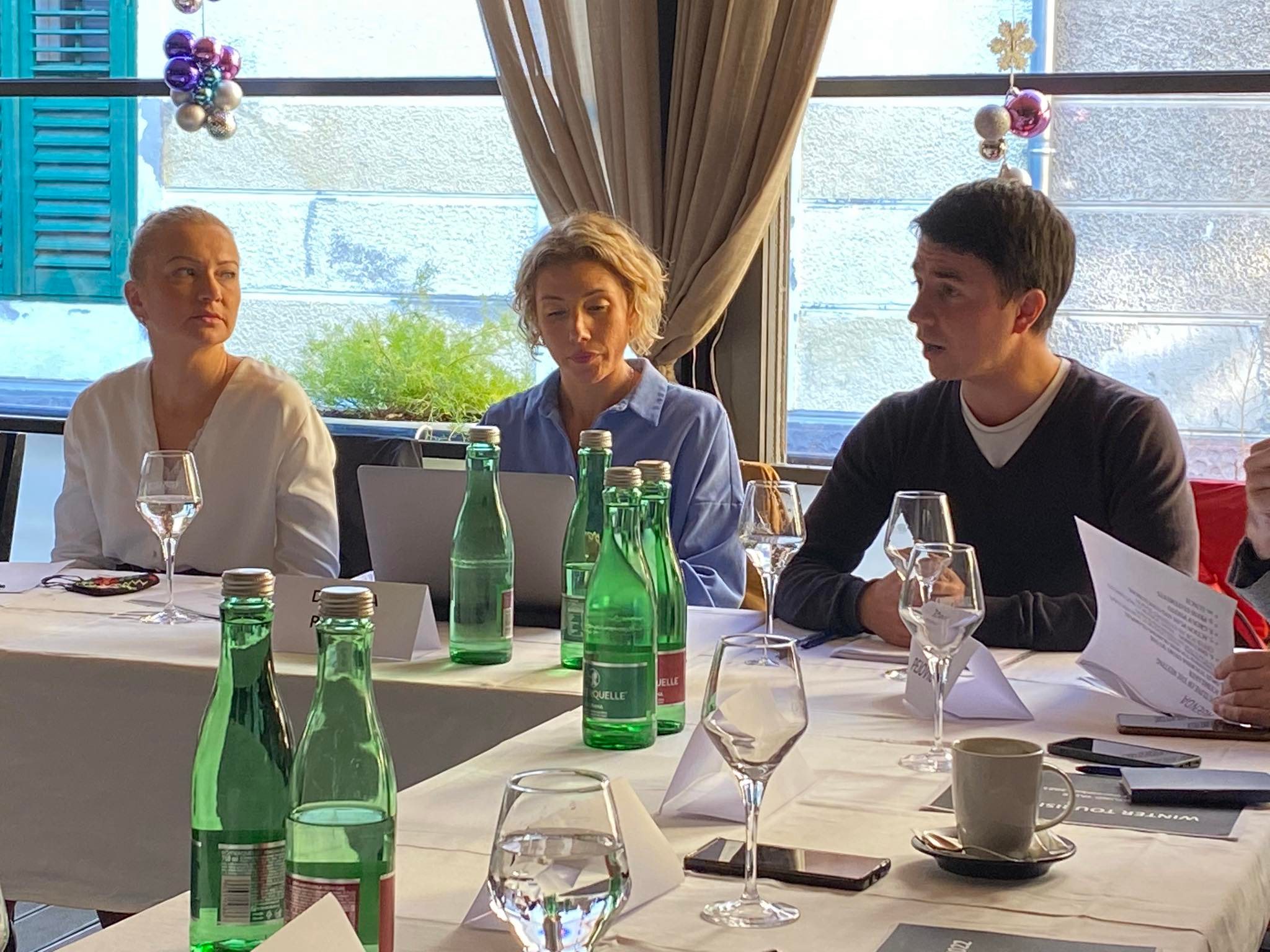
(Three stars - Jamina Kruscic, CHOPS Grill hostess, Daniela Rogulj of TCN, and moderator Michael Freer)
You can read the minutes of the meeting here, as well as the proposed action plan to get to the next level - many thanks to Daniela Rogulj for the huge amount of work that this entailed.
Here were some of my key takeaways:
1. The amount of knowledge, experience, connections, and ability in that room was frightening. As was the realisation of how disconnected it was. When Zoran casually mentioned that he was bringing 200 million euro of investment to Central Dalmatia, I smiled. It has come a few minutes after Ante Lacman bemoaned the inability of Split to heed simple requests to close a road, so that a 7-figure (euro) car launch could take place in Split. So many people dealing with so many big numbers, with no coordination with the other stakeholders. As I drove to Zadar, Zagreb and finally Osijek the next day, the very thought of being able to have a coordinated approach with all those stakeholders singing from the same hymn sheet would transform everything.
2. The engagement of Mayor Puljak and his desire to learn was impressive. It is no secret that tourism is not his strongest card, but I left with the feeling that he too wanted to unblock some of the roadblocks we are encountering.
3. The comment of consultant Mario Seric gave me additional reason to dare to dream of a good end result. Mario is a veteran of a 2008-9 initiative to bring winter flights to Split (and with some success - one of its legacies is the Split to Munich year-round flight). He agreed to give a presentation on the lessons learned from 2009 (and did so superbly), but I know that he - like Zoran - had zero expectations from the roundtable, and he was probably only there as a favour to me. Mario's conclusion that if he had had Josko, Ivica, Tonci and Alijana as the public officials to deal with back in 2009, there would probably have been a different outcome.
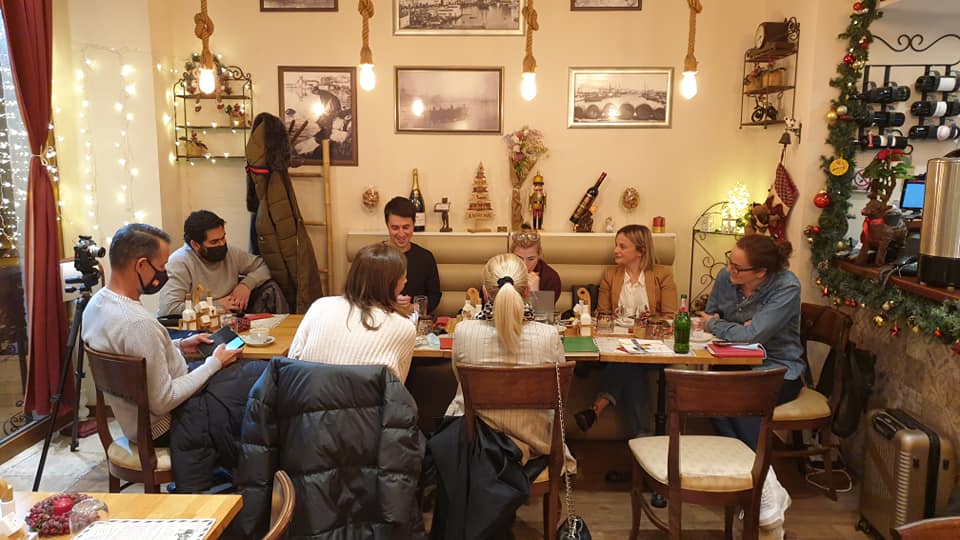
(One of the many meetings before the roundtable)
4. Pero from Split Airport was a total star, and a very transparent one. Split Airport has always been a mystery to me, and I have never met any official from there, but his openness and engagement with everyone helped to break down barriers and misconceptions, and we all left with a greater understanding of why things are the way they are, and how we can slowly effect change with a longer season of flights.
5. One thing I have learned in 2021 is that even though Croatia is a very bureaucratic country, effective public-private partnership IS possible in Croatia. Not all public institutions are as ineffective and irrelevant as the Croatian National Tourist Board, and the award-winning partnerships of Saltwater Nomads, Total Croatia News and firstly Zagreb Tourist Board, but also the City of Dubrovnik and Dubrovnik Tourist Board with Zagreb Digital Nomad Week & Ambassador Program and Dubrovnik Digital Nomads-in-Residence Program show how impactful those public-private partnerships can be when focused on a common goal. I left the roundtable with the feeling that there is now an opportunity to build on the energy of Monday's meeting to create something similar with the stakeholders from the roundtable.
6. Split, Central Dalmatia, or probably Dalmatia itself has a branding problem. Istria does things so much better, but I don't believe the core quality of the raw product is any better in Istria than in Dalmatia. Dalmatia needs to be branded properly, things need to be proactive rather than reactive. With consultants such as Mario Seric and Zoran Pejovic already stakeholders in this initiative, why not engage them to use their expertise and contacts to brand Dalmatia properly once and for all?
7. We have the right stakeholders at the table. What I really enjoyed about this whole process was seeing it come together and seeing how various stakeholders understand the limitations and possibilities of the other side. State Secretary Glavina has experience in the private sector, our charming hostess Jasmina Kruscic was once a tourist board director, and Jelena Tabak, a restaurant owner and Head of the Split Caterers Association navigates the waters expertly. So many of the stakeholders were meeting for the first time, or at least exchanging ideas for the first time. More meetings like Monday (and the next one is planned for next month) will build trust, confidence, brainstorming - and ultimately results.
8. CHOPS Grill really is the best meat restaurant in Dalmatia, and a fantastic and hospitable venue for such an event. Thank you, Jasmina, for your generous support.
Real progress was made, and I am very heartened by everything that happened on Monday. Special thanks to the incredible quartet of ladies who were the real stars of all this - Jelena from CHOPS, Mare from B7, Dani from TCN, and Jelena from Dujkin Dvor. When they put together the Wikipedia page of how Split built its winter tourism, this photo below will be the lead shot.
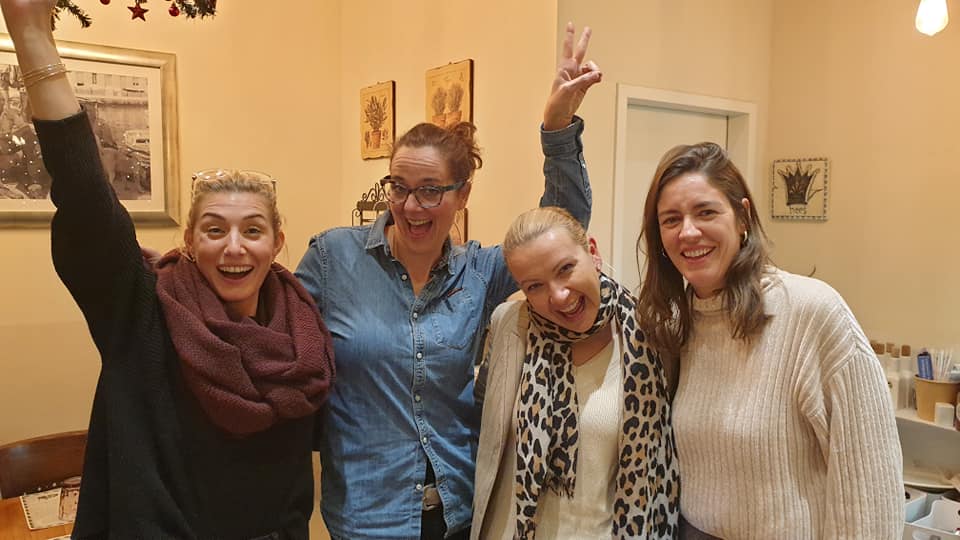
And a big thank you to Michael Freer, whose moderation and facilitation played a huge part in getting us this far. I look forward to meeting - and reporting - again next month.
To be continued...
UEFA Nations League Draw: Croatia to Face France, Denmark, Austria
December 16, 2021 - The UEFA Nations League draw was held tonight. Croatia has been drawn into Group 1 against France, Denmark, and Austria. The 2022 Nations League competition will be played next June and September.
Croatia learned who they will play in the 2022 Nations League tonight. The Croatia national team will play in the elite A league against
Croatia was placed in the third strong hat and could not be drawn against England, Poland, and Switzerland. As in the previous edition, Croatia would face two stronger opponents and a slightly less attractive national team from the weakest, 4th hat.
Potential opponents for Croatia in the A league were one national team from each of these three strong groups:
Group 1: France, Spain, Italy, Belgium
Group 2: Portugal, Netherlands, Denmark, Germany
Group 4: Wales, Austria, Czech Republic, Hungary
What is particularly interesting are the dates that UEFA has planned for these six group matches. Due to the complicated football calendar thanks to the 2022 World Cup in Qatar, which will be played in November and December next year, the Nations League dates have been tightened to just two months.
Namely, the Nations League will be played in June and September, with four games in just two weeks in June next year, while two games are planned for September.
From June 2 to 14, i.e., across 12 days, UEFA has planned four games to be played every three days. This term is not ideal, as footballers will already be exhausted after the club season come to an end.
It is not yet known how this Nations League season will affect the qualifications for Euro 2024. UEFA has said that this has not yet been decided.
To read more about sport in Croatia, follow TCN’s dedicated page.
Choosing Between Living in Zagreb or Dalmatia, Two Years Later
December 16, 2021 - After getting to know the capital of Croatia better this year, I was already imagining my life in Zagreb. However, one has to think twice before leaving Dalmatia behind so easily.
Seven months in Rijeka, and eight in Podstrana, which is located about 20 minutes south of Split. That is the time that, until March of this year, I had spent in Croatia since I arrived for the first time in October 2019. At that time I felt an urge to get to know the country beyond the coast, and Osijek was my main choice. Unfortunately, things did not work out for me to move to Slavonia, and my next destination would be Zagreb.
The impact of Zagreb on me was immediate. Parks everywhere, such a walkable city, a great public transport system, things to do everywhere and at all times, movement, life, great food... Zagreb has it all. One of the reasons why I went to Zagreb was to find a job, and this was the case in my second week there. I interpreted it as a sign to realize that my place was there, in the capital of Croatia.
A short video that I recorded and edited on the way from Split to Zagreb, with an emphasis on the landscapes between the two cities.
I would have liked to continue this article by saying that, after a few months, I managed to settle in Zagreb. But one thing led to another, and I ended up in Split after four months. Some will believe that because it was summer the decision was a bit obvious, but at some point, I really saw it possible to spend those hot months away from the coast. In July I returned to help my parents with our accommodation business during the season, and I was not yet financially ready to pay rent. In Zagreb, I was residing in student accommodation thanks to a scholarship, so that made it easy for me to live there.
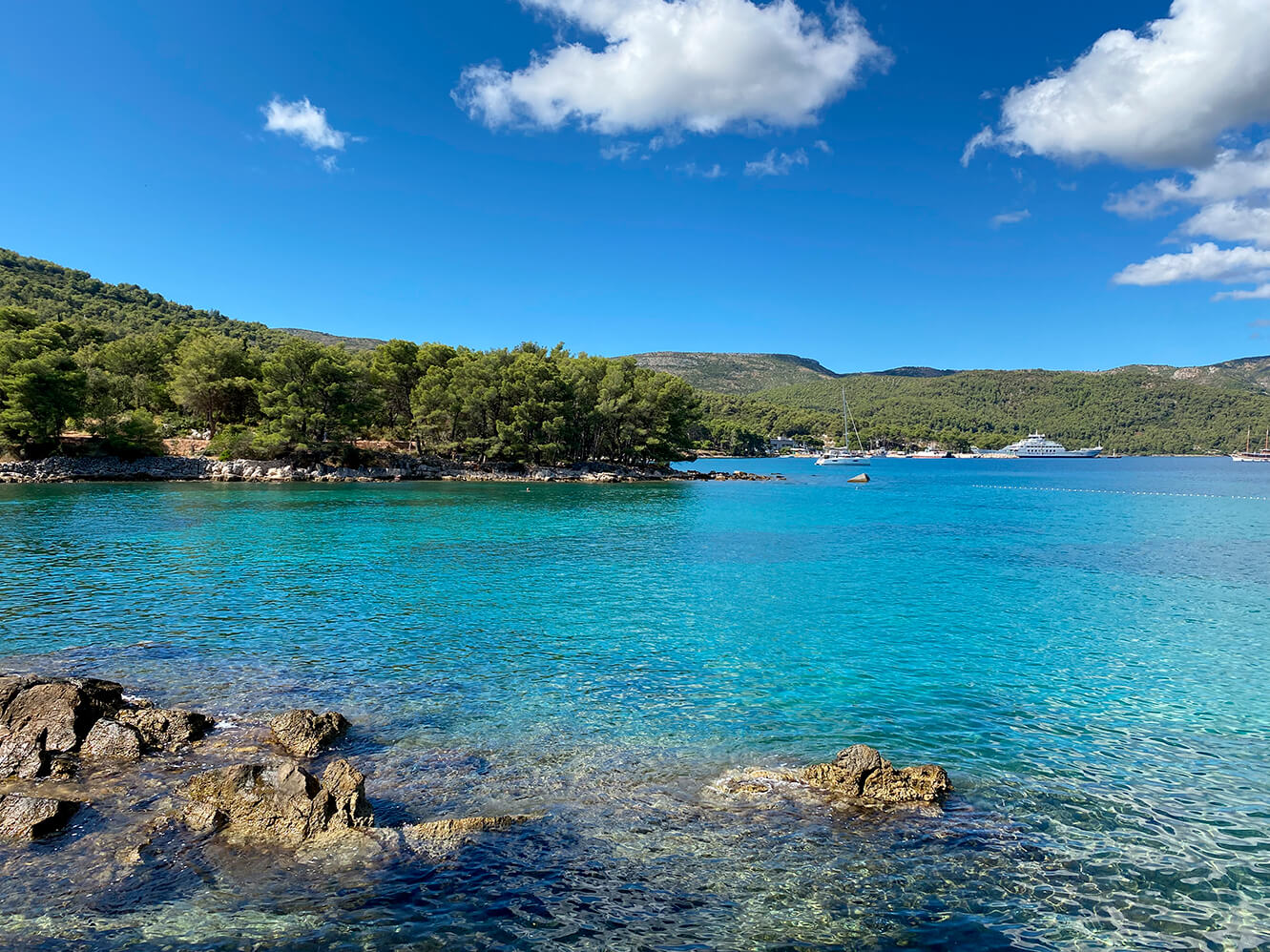
The view from Lanterna Beach, between the town and the ferry port of Stari Grad, on the island of Hvar. Heaven on earth. (Photo: Jose Alfonso Cussianovich)
I cannot say that I returned with sadness in my soul - the summer was spectacular, and for me, it is always special to be close to my family. The job I have allowed me to work in any corner of the country, so it wasn’t a big deal to move again. The reception of dozens of tourists who arrived during the season and the several beach days made summer go by very quickly for me. In the blink of an eye, it was already September. The climate in Dalmatia was the same or even more pleasant than in the previous months. I was aware that summer 2021 was slowly disappearing, but beach days, ice-cold beers, and air conditioning were still part of the routine. I still remember with great happiness the visit of my cousins, with whom we visited one of my favorite places - Stari Grad, on the island of Hvar. September was indeed a special month.
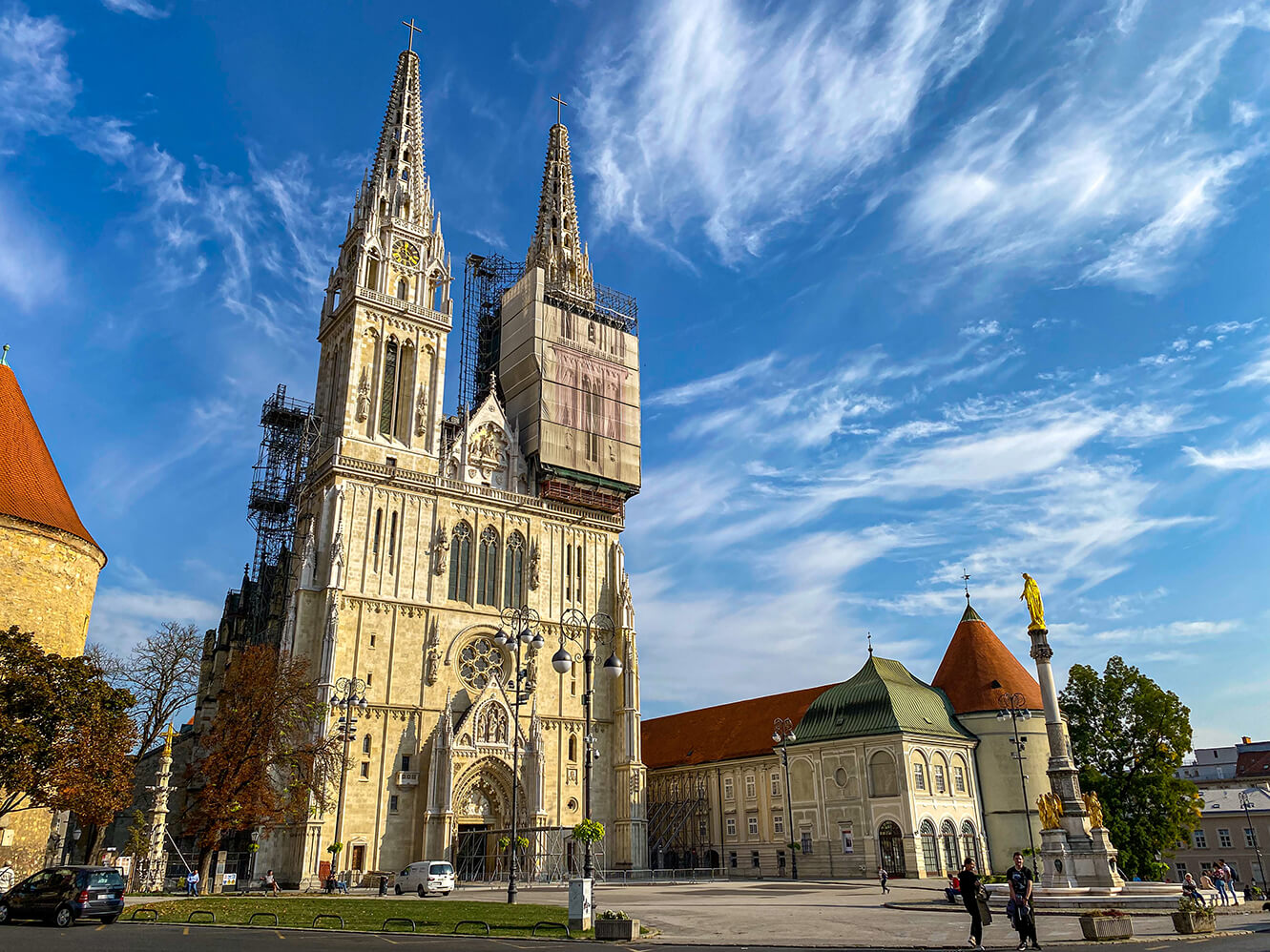
Zagreb Cathedral, when I visited the capital of Croatia in early October. (Photo: Jose Alfonso Cussianovich)
October came, and I noticed the changes when I made a short trip to Zagreb. The colors of the forests that accompany the E65 and E71 roads changed from strong green to reddish. The week I was in Zagreb, earlier that month, reminded me how much I missed the things I liked about it. That's when I said that, as a goal, I would come back at least once a month even if it's just to visit.
Shortly after that brief stay, I managed to convince my parents to go back together to spend a few days in the capital. We stayed around the corner from the Cathedral, and we really had a great time in those few days.
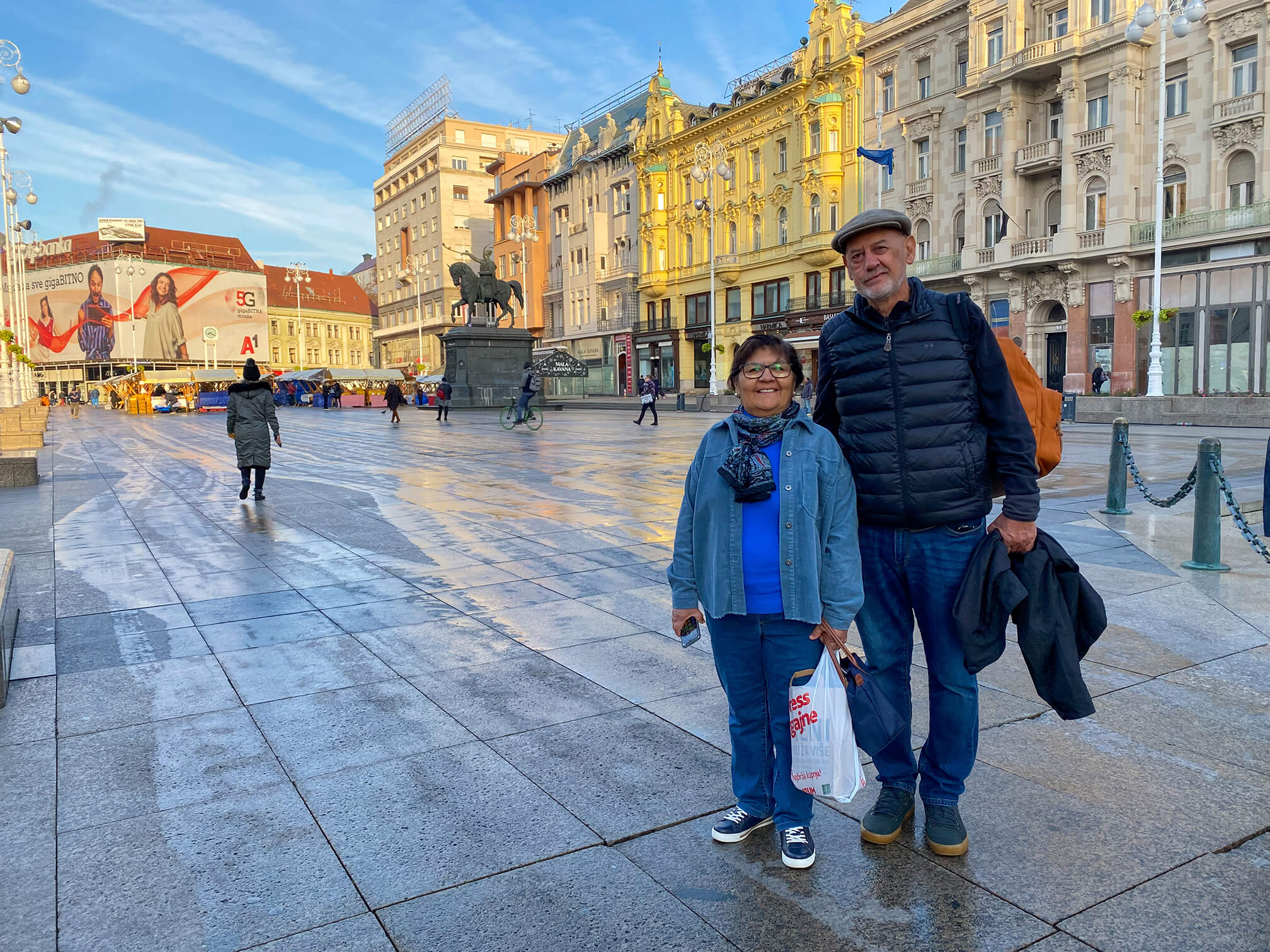
My parents, in Ban Josip Jelačić square on our little trip to Zagreb in October. (Photo: Jose Alfonso Cussianovich)
My next visit would be last week when it was time to celebrate TCN's Christmas dinner. It was the first time I went to Zagreb with a pre-winter ambiance. Despite the cold weather, I have never seen a city as lively and vibrant as Zagreb is in Advent. I kept reminding myself of the many benefits that living in Zagreb entails, which even go beyond the lifestyle, such as the efficiency of public institutions or the ease of meeting new and valuable people even in such everyday situations.
Zrinjevac Park in Zagreb, during Advent. (Photo: Jose Alfonso Cussianovich)
By then, I was already thinking about the cost of living there and it even occurred to me to try to convince my parents that living in Zagreb and running our business in Split at the same time was a very feasible alternative.
But it was time to return to Split, and in less than a week, I reconsidered everything I had been thinking throughout this year about living in Zagreb. Five things made me change my mind.
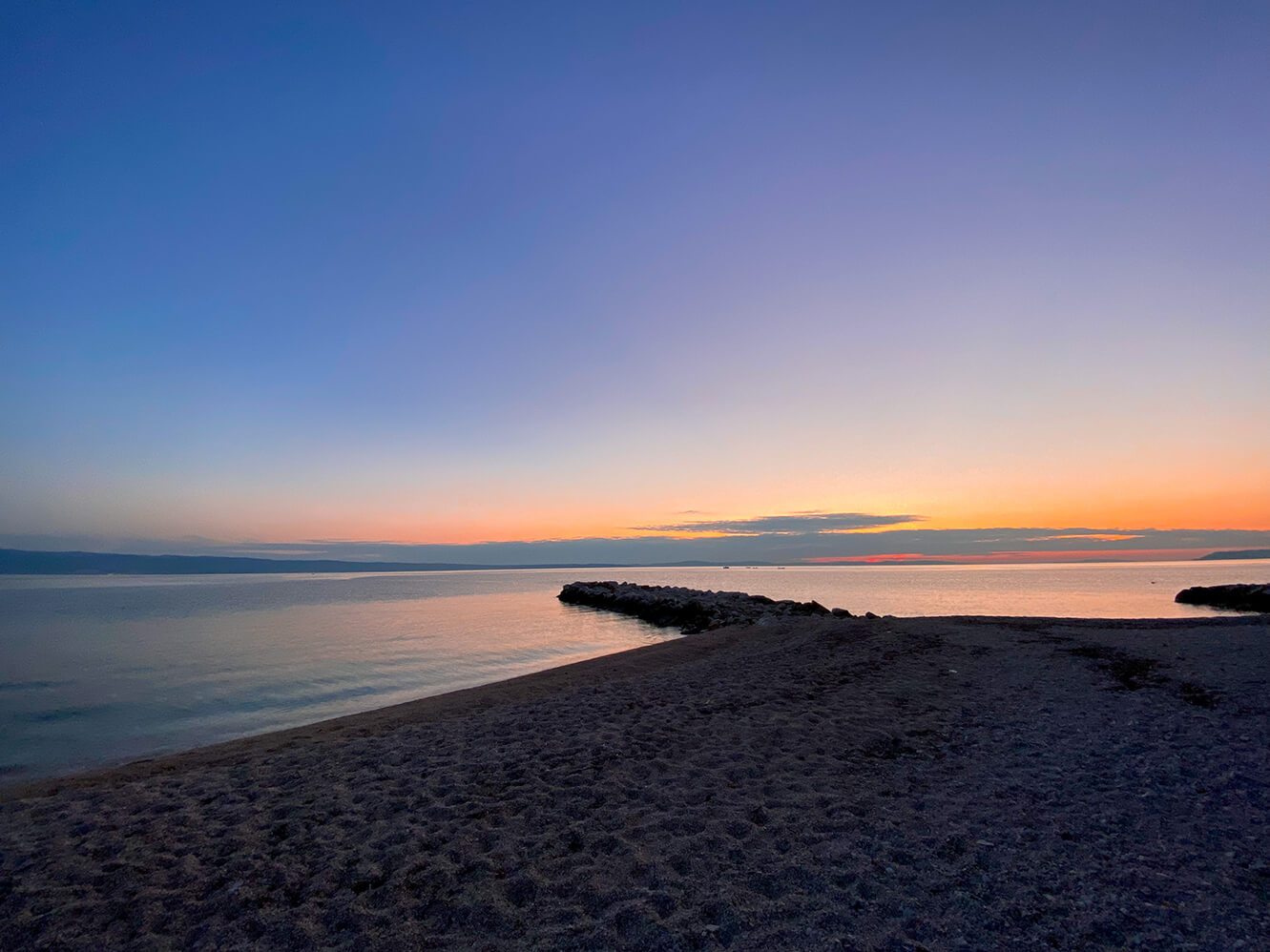
One of the many scenes that one can find when walking along the beaches of Podstrana. In this case, between sv. Martin and the Le Meridien Lav hotel. (Photo: Jose Alfonso Cussianovich)
First of all, I decided to walk along the beaches of Podstrana, from Saint Martin to the Le Meridien Lav hotel, during sunset. It is definitely not the ideal time to take a dip in the sea, but just being close to the Adriatic Sea is more than enough for me and I couldn't afford to be so far from the sea. This almost spiritual walk has been crucial for me to think things over.
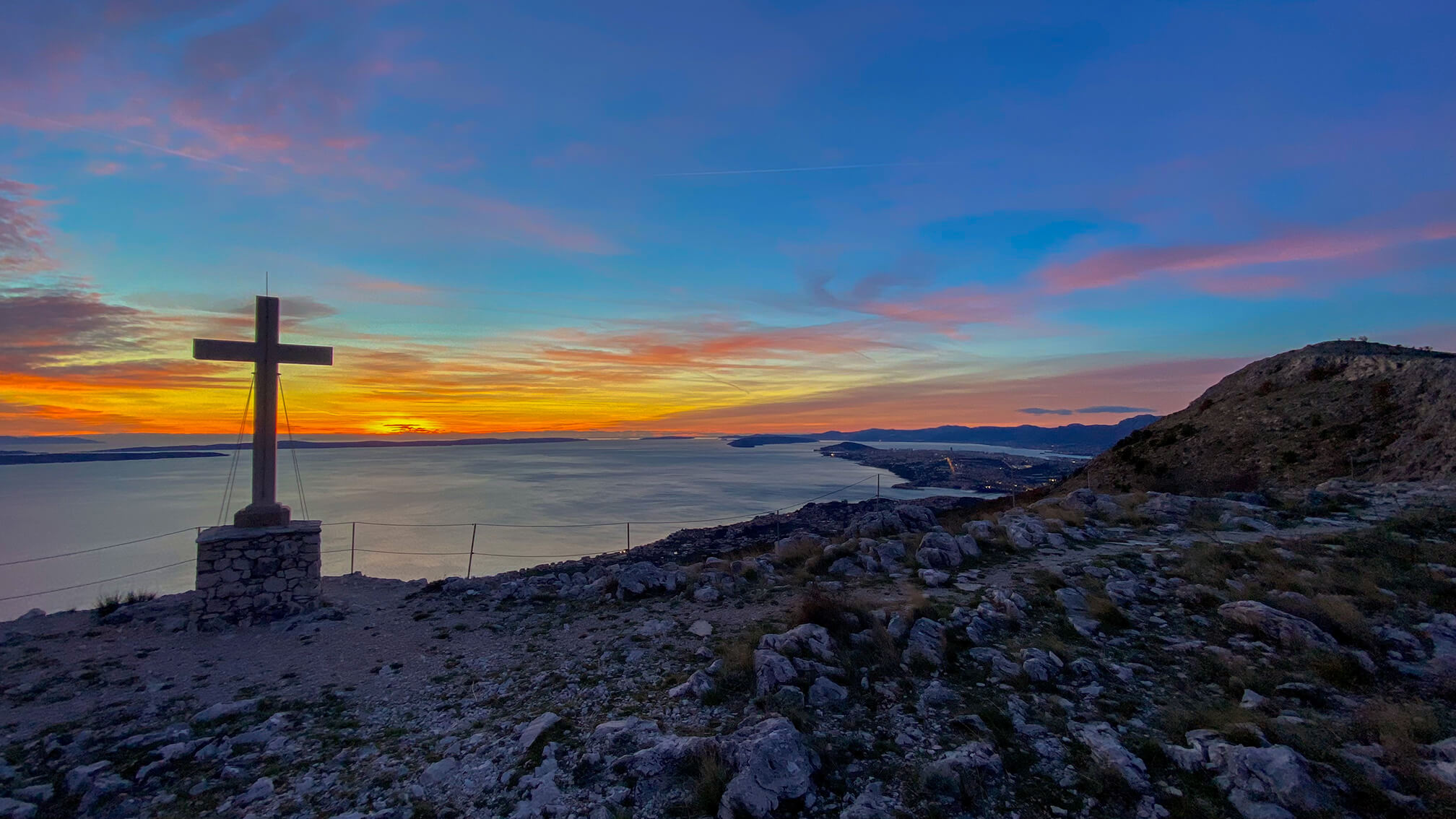
The view from the mountain, in Podstrana, next to the church of sv. Juraj. Below right, you can see the city of Split. (Photo: Jose Alfonso Cussianovich)
Secondly, the little hikes I made to the upper part of Podstrana these last two days, both on a small hill behind my house and on the mountain where the small church of St. Juraj is located. In recent weeks, gray skies, cold weather, and storms prevailed. But when I returned from Zagreb, I found sunny days, warmer weather, and stunning sunsets. The images I captured of these last two days, both in photo and video, speak for themselves. Never in my life have I witnessed such spectacular views, and that’s not an overstatement.
A short video that I recorded and edited in Podstrana, where I live, between December 14th and 15th. The sunsets were spectacular.
Third, the Split Winter Tourism roundtable. I had the great opportunity to be present at the previous meetings and at the great event held at Chops Grill on Monday. Although my role was quite minimal, the important thing for me was being able to listen to many of the people who in recent years have moved mountains to make Split a twelve-month destination and those who could finally make it happen. Self-criticism, ideas, potential collaborations, their will... all this helped me to think that the future in Split can only be better, especially if intentions and actions go hand in hand this time. It excites me to think that, with the skills and ideas that I have, I can be part of that change, in some way.
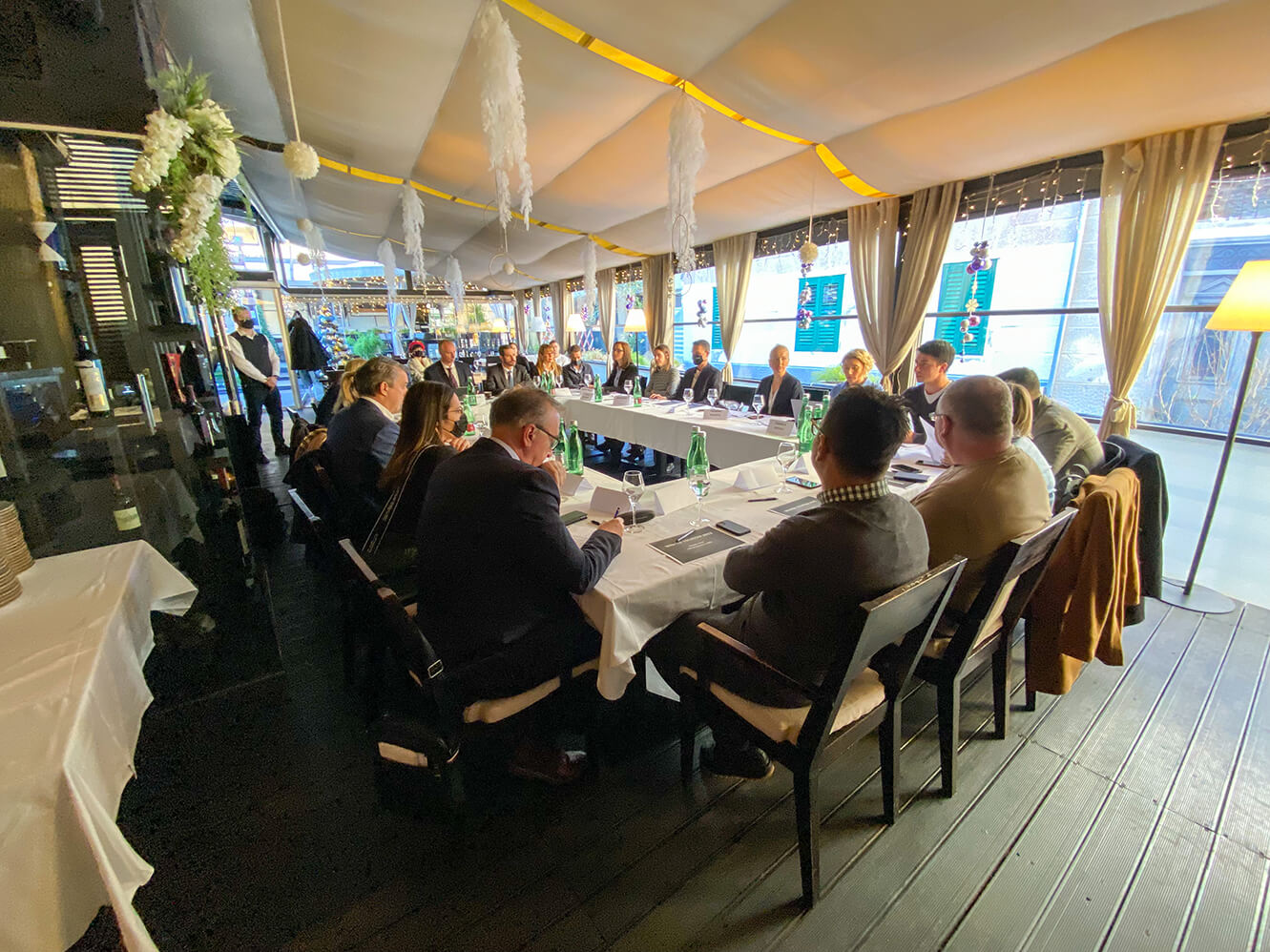
The Split Winter Tourism Roundtable, which was held at Chops Grill on Monday. (Photo: Jose Alfonso Cussianovich)
Fourth, and you probably think that I let it slip when I remembered October: the olive trees. "Who in his right mind chooses one place for another, just for the olive trees?", you might ask yourselves. It is not so much for the trees themselves, but for the experience. I was aware that the olive harvest season began in mid-October, and after missing the opportunity to see it up close at the Olive Picking Competition on the island of Brač, I decided to be more attentive to the slightest chance to live that experience.
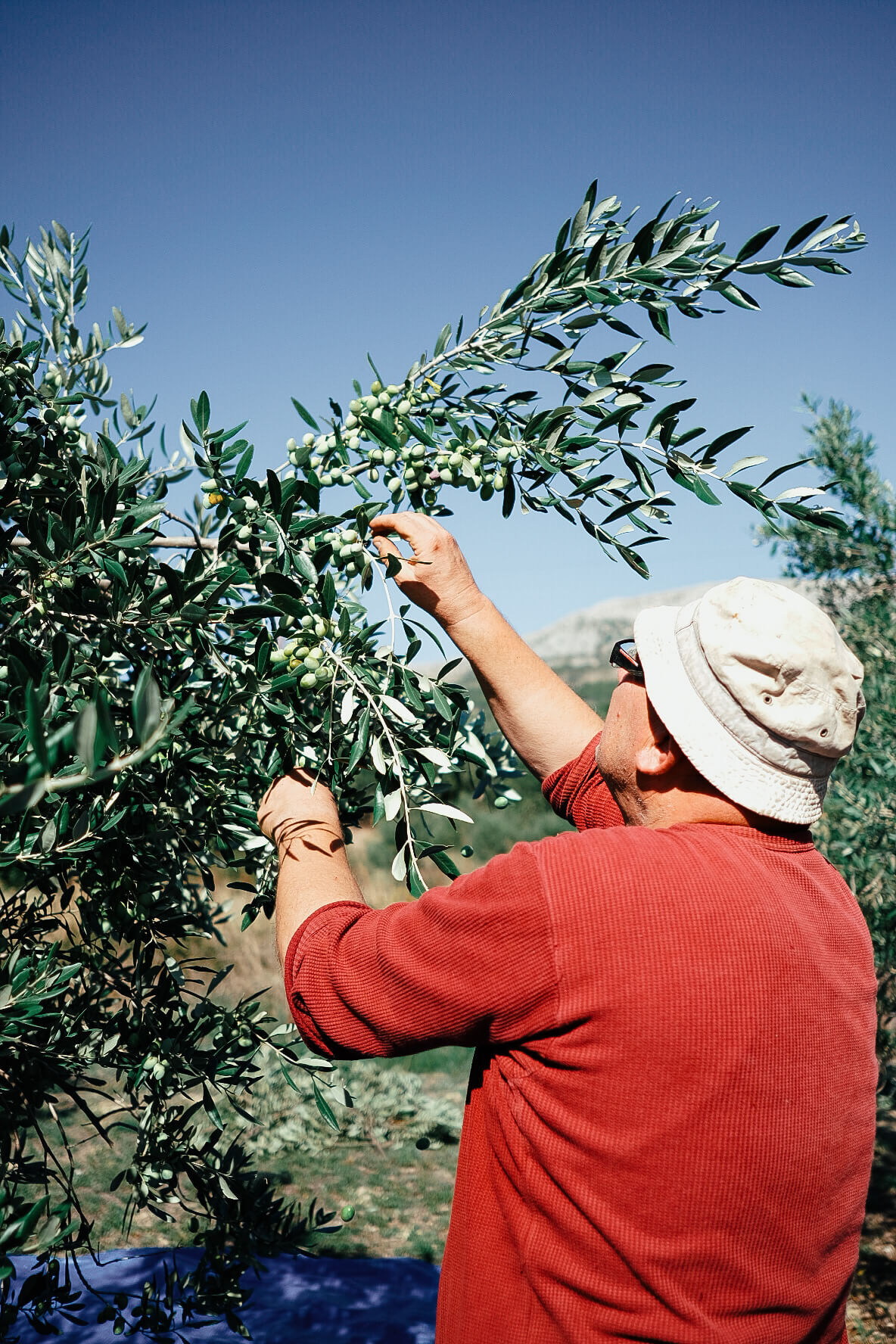
One of the photos I took while accompanying some neighbors from my neighborhood while picking olives from their trees. (Photo: Jose Alfonso Cussianovich)
Fortunately, behind the building I live in, there are many olive trees. For several days I looked to see if someone was coming to collect the olives, and indeed one day it happened. Without thinking twice, I walked there with my camera and asked a family of three if I could take some photos of them and record some videos while they picked the olives. What at first seemed like a journalistic task, turned into a very friendly afternoon in which we shared stories, and especially the father, who told me for hours everything I should know about a tradition as ancient as collecting olives. You know that as you go up the highway towards the mainland, the olive trees begin to disappear. You probably think it's a bit of a silly reason, but I just don't see myself living far from these kinds of experiences. Truth be told, one of my dreams is to have my own olive tree and make my own olive oil. So there you have it.
Last, and maybe most importantly, my Croatian ancestor, Pero Kusijanović, was born in the small district of Mokošica, in Dubrovnik and was, by all means, a true Dalmatian. Pero migrated to Peru approximately 150 years ago, and I don't think he would have ever imagined that his descendants would choose to return and settle in Zagreb, far from the Adriatic. I will honor him, in some way, trying to move my future forward here in Dalmatia.
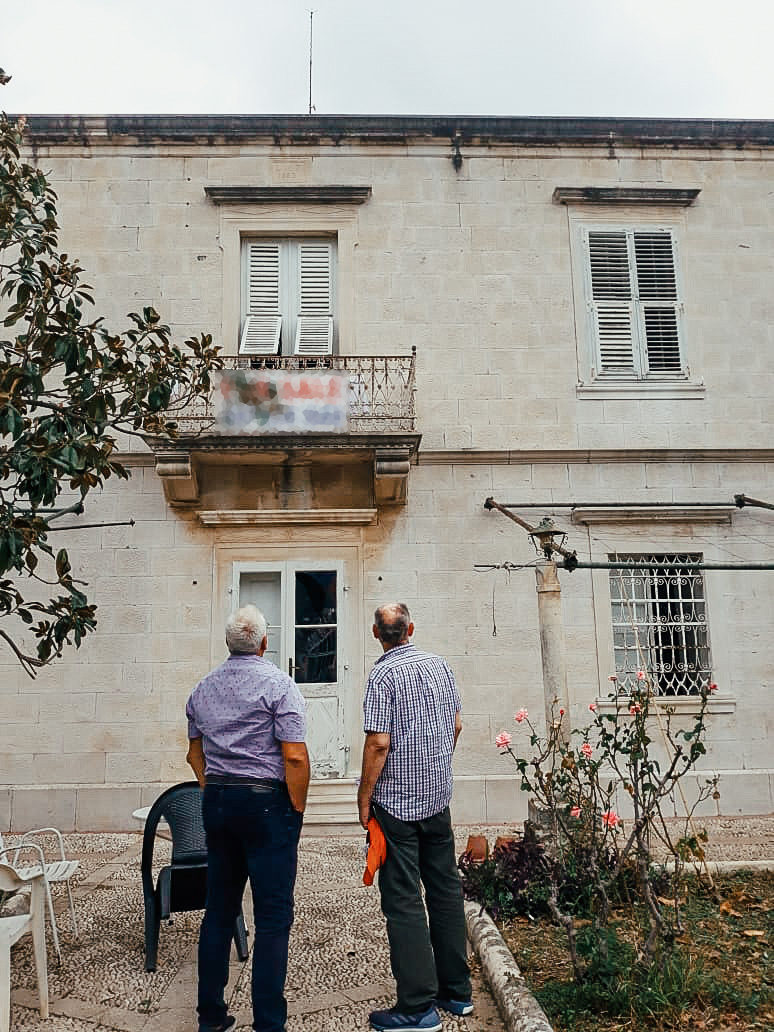
My father (right) visited the house in Mokošica, where our ancestor, Pero Kusijanović, was born and raised. (Photo: Patricia Medina)
I will never regret the experiences and moments lived anywhere other than here. If something makes a country like Croatia special, it is that each of its square kilometers has something prepared for you, and capable of marking you for life. But I do have to admit that there have been times when I underestimated the beauty of living in Dalmatia, and for that, I apologize. Sometimes you don't have to make pros and cons lists to compare one place to another. Sometimes the region has a vibe that is difficult for others to feel or understand, as the great Daniela Rogulj would say.
Many believe that Dalmatia is only the islands and the coast (which alone are good reasons to settle here), but many are unaware of the history and beauty of places Knin or Sinj, the latter I was able to visit at the end of October with my family and really blew me away.
Split, Zadar, Dubrovnik, Šibenik, Ston, Trogir, Korčula, Hvar, Knin, Sinj, Primošten, Omiš, Makarska... how can you forget about these places and many others with such ease? Sometimes it is about what a place already is, and sometimes what a place can become. For the moment, I choose the latter. There’s so much for me to discover here before jumping to conclusions, or Zagreb.
For more, check out our dedicated travel section.
Croatia's Coronavirus Update: 3,765 New Cases, 46 Deaths
ZAGREB, 16 Dec 2021 - In the last 24 hours, of 11,713 tests conducted for coronavirus in Croatia, 3,765 (32%) have turned out to be positive, and 46 more COVID patients have died, raising the death toll to 11,825, the country's COVID-19 crisis management team reported on Thursday.
Currently, there are 24,082 active cases of the infection in Croatia, with 2,253 of them in hospital, including 286 patients placed on ventilators.
Since the first registered case of the novel virus in Croatia on 25 February 2020, 666,162 people have been diagnosed with this infectious disease, and of them, 630,255 have recovered so far, including 3,346 recoveries in the last 24 hours.
During the vaccine rollout plan, 2,235,161 persons have been given at least a jab, and 60.85% of adults have fully been vaccinated.
For all you need to know about coronavirus specific to Croatia, make sure to bookmark our dedicated section and select your preferred language if it isn't English.
FM Says President's Comments on EU Conclusions on Bosnia Malicious
ZAGREB, 16 Dec 2021 - Foreign Minister Gordan Grlić Radman on Thursday called out President Zoran Milanović over his criticism of the government's support for the Council of the EU conclusions on Bosnia and Herzegovina, describing the president's statement as malicious and an attempt to destabilise the government.
"The Ministry of Foreign and European Affairs rejects in the strongest terms the malicious insinuations that are detrimental to Croatia's interests, about Croatia's having endorsed conclusions that do not guarantee the rights of the Croats in Bosnia and Herzegovina as a constituent people," Grlić Radman told a news conference in Zagreb.
In a letter he forwarded to Prime Minister Andrej Plenković on Wednesday, Milanović expressed dissatisfaction with and opposition to the Council of the EU conclusions, adopted on Tuesday, claiming that they do not guarantee rights to Bosnia and Herzegovina Croats as a constituent people in the country.
Grlić Radman today said that the conclusions' making mention of the Dayton Agreement "implies the constitutionality of the three peoples in Bosnia and Herzegovina."
The minister described Milanović's criticism as an attempt to destabilise the government.
While earlier conclusions of the Council of the EU, adopted during the terms of previous Croatian governments, made no mention of the constituent peoples of Bosnia and Herzegovina, the part of Tuesday's conclusions concerning Bosnia and Herzegovina and the election reform in that country makes mention, at Croatia's request, of the importance of implementing rulings by the BiH Constitutional Court, which was not envisaged by earlier drafts, the minister said.
Grlić Radman said that the message of the conclusions adopted by the General Affairs Council was unequivocal: it is necessary to eliminate all forms of inequality and discrimination in the election process and implement decisions of Bosnia's Constitutional Court as well as the Sejdić-Finci ruling of the European Court of Human Rights.
For more, check out our dedicated politics section.
Scientist: Several Thousand More Lives to Be Lost if We Don't Prepare for Fifth Wave
ZAGREB, 16 Dec 2021 - If Croatia does not prepare for the fifth wave of the coronavirus pandemic, the infectious disease is likely to claim several thousand more lives, academician Ivan Đikić, a Croatian scientist who works in Germany, said in a letter to PM Andrej Plenković and Health Minister Vili Beroš on Thursday.
Calling on the government to acquaint the public with its future strategy, Đikić expressed concern about the gravity of the situation and the danger of a fifth wave of the pandemic that could claim a large number of lives in Croatia.
Đikić said that he received on a daily basis queries from concerned citizens who wonder how they should behave in the current situation, who should get a booster dose, if the booster dose protects against the Omicron variant, which tests are safe, etc.
50 COVID-related deaths a day very high figure
It is a fact that Croatia is close to the top of the EU ranking in terms of the number of coronavirus deaths per million people during the fourth wave, and this sounds the alarm and calls for urgent preventive action, he said.
"Around 50 people die of COVID-19 in Croatia on a daily basis, which is a very high figure. If we do not prepare early enough for the fifth wave, we are set to lose several thousand more citizens during the fifth wave," he said, calling on the PM and the health minister to present accurate data and risks related to the Omicron variant and inform citizens about the government's future strategy.
Omicron dangerous variant, booster dose contributes to protection against it
Noting that the Omicron variant is a dangerous variant, two to three times more contagious than the Delta variant, Đikić called on Plenković and Beroš to ensure fast detection and monitoring of the Omicron variant, present a strategy to prevent the fifth wave of the pandemic, and encourage all citizens above 18 to get a booster dose.
Currently available data shows that additional vaccination has a significant positive effect and contributes to protection also against the Omicron variant, Đikić said, calling for launching a more serious vaccination campaign so as to achieve a significant level of collective protection and prevent excessive pressure on hospitals and fatalities.
He also said the Health Ministry should provide accurate and clear information on testing for coronavirus, describing as wrong messages that suggest citizens should get tested for cellular immunity as the best indicator of whether one should get a booster dose.
According to available data, a cellular immunity test based on which an official decision would be made on additional vaccination has not been approved anywhere in the world, he said, but added that there have been cases of citizens testing positive for cellular immunity and being advised not to get a booster dose after which they contracted the disease.
Đikić also called on the government not to allow profiteering related to coronavirus tests, warning that wrongly interpreted COVID tests can lead citizens to believe that they are protected even though they are not, thus causing the already complex epidemiological situation to worsen.
Warning of numerous cases of scientifically unfounded statements in the media, made by individual scientists, including members of the government's scientific council, "to which neither the Health Ministry nor the government had reacted timely", Đikić said that this caused unnecessary damage and undermined citizens' trust in state institutions.
"Respond competently, clearly, and timely to scientifically unfounded statements in the media," he said.
For all you need to know about coronavirus specific to Croatia, make sure to bookmark our dedicated section and select your preferred language if it isn't English.
Flammable Object Thrown at HDZ Party Offices in Bjelovar
ZAGREB, 16 Dec 2021 - A flammable object was thrown at the offices of the HDZ party county branch in Bjelovar on Wednesday, and police are investigating the incident.
The party's county branch said its offices were also broken into and vandalized three days ago, calling on other political parties to condemn the incident and help defuse tension in society, which, "certain stakeholders knowingly incite with their radical rhetoric".
Police said the flammable device thrown at the party offices caused a soot stain on the building's facade.
The incident was condemned by the local Social Liberal Party (HSLS), a coalition partner to the HDZ party at the national level.
For more, check out our dedicated politics section.
Program Encouraging Reading to Children Presented
ZAGREB, 16 Dec 2021 - Culture and Media Minister Nina Obuljen Koržinek on Wednesday presented a national program aimed at encouraging parents to read to their children from an early age on.
The program, called "Born to read", is implemented by the Culture and Media Ministry in cooperation with the Ministry of Health and with the support of the Croatian Pediatric Society and the Croatian Society of Preventive and Social Pediatrics.
Speaking at a training course for pediatricians in Slavonski Brod, Obuljen Koržinek said she expected the program to encourage parents to read to their children.
The program is part of the national strategy for the promotion of reading, adopted in 2017, and it was presented at the end of the Year of Reading.
The minister said that the implementation of the program would start in 2022 and that it involved pediatricians who would work on raising parents' awareness of the need to start reading to their children as early as six months of age as a way of strengthening the child's competencies.
Research shows that reading to children helps develop their intelligence, cognitive abilities, and generally their literacy. In Croatia, only one-third of parents are aware of the importance of reading to children and the percentage of parents who actually read to their children is even lower, the minister said, expressing hope the project would help raise awareness among parents about the benefits of reading to children.
The minister noted that a program of this kind had been underway in Italy for some 20 years and that it had yielded the desired positive changes.
Throughout next year education courses will be held for pediatricians about the importance of encouraging reading to children.
The idea to launch the program came from Dr. Marija Radonić.
For more, check out our dedicated politics section.


